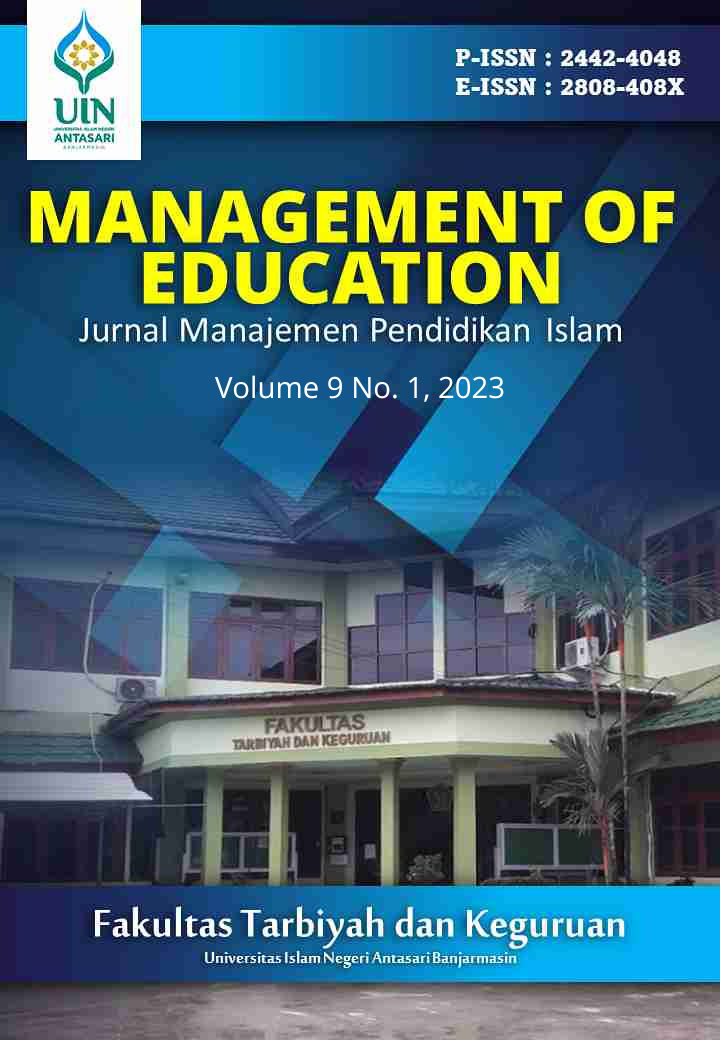PENERAPAN STRATEGI EKSPERIMEN DALAM UPAYA MENINGKATKAN HASIL BELAJAR IPA SISWA SD NEGERI 091423 AFD III BAH BOTONG TAHUN AJARAN 2022/2023
DOI:
https://doi.org/10.18592/moe.v9i1.8951Keywords:
Strategies, Experiments, Learning OutcomesAbstract
This research is motivated by the conditions of science learning at schools, where learning activities are still taking place conventionally, namely dominated by teachers so that students are less enthusiastic about participating in the science learning process and the low science learning outcomes on the subject of the properties of light. In this case the researchers tried to overcome these problems by using experimental methods in the science learning process in class. The focus of the research in this thesis are: 1) What is the learning process by applying the experimental method to improve science learning outcomes on the subject of the properties of light for fifth grade students at SD Negeri 091423 Affd. ill. Bah Butong academic year 2022/2023? 2) What are the results of studying science in the subject matter of the properties of light with the application of the experimental method for fifth grade students at SD Negeri 091423 Afd. III. Bah Butong academic year 2022/2023? This study aims to describe the learning process by applying the experimental method and knowing the results of science learning on the subject of the properties of light by applying the experimental method to fifth grade students at SD Negeri 091423 Afd. III. Bah Butong for the 2022/2023 academic year. In this study used data collection methods in the form of: tests, observations, interviews and field notes. Where tests are used to determine students' cognitive learning outcomes after experiencing the teaching and learning process, observation is used to observe the learning process and to determine affective and psychomotor learning outcomes, interviews are used to determine student responses, as well as to obtain the information needed, and field notes are used to complete the unrecorded data. The approach used is a qualitative approach and the type of research is classroom action research. After the writer carried out two cycles of classroom action research and obtained the necessary data from the existing facts, the researcher can draw the following conclusions: The science learning process on the subject of the properties of light goes through several stages, namely (1) the teacher conducts initial experiment, (2) students observe experiments, (3) students formulate temporary observations, (4) students conduct their own experiments, (6) students are able to apply and give examples, (7) the teacher gives an evaluation. While student learning outcomes in science learning through the application of experimental methods can increase from cycle I to cycle II. Cognitive aspects of learning outcomes increased by 13.9% while psychomotor aspects of learning outcomes increased by 13.8% and affective learning outcomes increased by 10.41%References
Alin Putri Dianti, Amaliyah, A. ., & Puspita Rini, C. . (2021). Analisis Kemampuan Komunikasi Matematis Dalam Menyelesaikan Soal Cerita Siswa Kelas Iv Sd Negeri Petir 4 Kota Tangerang. Berajah Journal, 2(1), 16–24. https://doi.org/10.47353/bj.v2i1.44
Aunurrahman (2012). Belajar Dan Pembelajaran, Bandung: Alfabeta,
Arikunto, Suharsimi.2010. Prosedur Penelitian Suatu Pendekatan Praktik Jakarta Rineka Cipta
B. Uno, Hamzah. 2007. Model Pembelajaran (Menciptakan Proses Belajar Mengajar yang Kreatif dan Efektif). Jakarta : PT, Bumi Aksara
Dimyati & Mudjiono, (2006). Belajar dan Pembelajaran. Jakarta: Rineka Cipta,
Hamalik, Oemar, 2010. Pendidikan Guru Berdasarkan Pendekatan Kompetenm, Jakarta: PT. Bumi Aksara, Cet, Ke-7
Istarani (2011). 58 Model Pembelajaran Inovatif, Medan : Media Persada, Istarani (2012). Kumpulan 39 Metode Pembelajaran, Medan : Iscom Medan,
Irzani, 2010, Pembelajaran Matematika Panduan Praktis Untuk Pengajar SD & MI, Yogyakarta: Mandiri Graffindo Press.
Kurniani Ningsih, S. ., Amaliyah, A. ., & Puspita Rini, C. . (2021). Analisis Kesulitan Belajar Matematika Pada Siswa Kelas Ii Sekolah Dasar. Berajah Journal, 2(1), 44–48. https://doi.org/10.47353/bj.v2i1.48
Muhibbin. 2006. Psikologi Belajar. Jakarta: Raja Grafindo Persada.
Mulyasa, E.2003. Kurikulum Berbasis Kompetensi. Konsep, Karakteristik dan Implementasi. Bandung : P.T. Remaja Rosdakarya
Nurma Yunita, R. ., Puspita Rini, C. ., & Amaliyah, A. . (2022). Analisis Kesalahan Siswa Dalam Mengerjakan Soal Matematika Kelas V Sdn Karang Tengah 11 Kota. Berajah Journal, 2(2), 257–268. https://doi.org/10.47353/bj.v2i2.85
Ridwan Abdul Sani (2013). Inovasi Pembelajaran. Jakarta : Bumi Aksara. Rosmala Dewi (2010). Penelitian Tindakan Kelas. Medan : Pascasarjana Unimed,
Riinawati, R. (2021). Hubungan Konsentrasi Belajar Siswa Terhadap Prestasi Belajar Peserta Didik Pada Masa Pandemi Covid-19 Di Sdn Karang Mekar 4 Banjarmasin. Berajah Journal, 1(2), 72-75.
Sanjaya, Wina. 2007. Strategi Pembelajaran (Berorientasi Standar Proses Pendidikan). Jakarta: Prenada Media Group
Silberman, Melvin L. 2007. Active Learning: 101 Strategi Pembelajaran Aktif. Yogyakarta: YAPPENDIS.
Slameto, 2010, Belajar dan Faktor-Faktor Yang Mempengaruhi, Jakarta: Rineka Cipta.
Sudjana, Nana. 2009. Dasar-Dasar Proses Belajar Mengajar. Bandung: Sinar Baru Algesindo.
Sugiyanto. 2008. Model-model Pembelajaran Inovatif. Surakarta : UNS Press. Sugiyono, 2008. Statistika untuk Penelitian, Bandung, Alfabeta.
Soleha, R. S., Enawar, E., Fadhillah, D., & Sumiyani, S. (2022). Analisis Kesulitan Membaca Permulaan Pada Siswa Kelas Ii Sekolah Dasar. Berajah Journal, 2(1), 58-62.
Downloads
Published
How to Cite
Issue
Section
License
Authors who publish with this journal agree to the following terms:
- Authors retain copyright and grant the journal right of first publication with the work simultaneously licensed under a Creative Commons Attribution 4.0 International that allows others to share the work with an acknowledgement of the work's authorship and initial publication in this journal.
- Authors are able to enter into separate, additional contractual arrangements for the non-exclusive distribution of the journal's published version of the work (e.g., post it to an institutional repository or publish it in a book), with an acknowledgement of its initial publication in this journal.
- Authors are permitted and encouraged to post their work online (e.g., in institutional repositories or on their website) prior to and during the submission process, as it can lead to productive exchanges, as well as earlier and greater citation of published work.









 This work is licensed under a
This work is licensed under a 